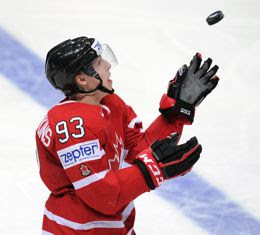With just days until the deadline, I want to try to tackle one of those questions that sounds simple but ends up being tougher than you might think: Who was the best worst player in an NHL trade?
In other words, if you took every player from a given trade and ranked them from best to worst, which trades from history give you a really good player in the last spot?
Clearly, we’re not looking at deals that only had one player involved, or even those with just two. Johnny Bucyk was probably worse than Terry Sawchuk, but that doesn’t really fit the spirit of what we’re going for here.
But a funny thing happens if you set the minimum at even three players: It suddenly gets really hard to find “good” bad players, because as it turns out, NHL GMs really love to start tossing random names into trades. Once you knock them out of the one-for-one equilibrium, they start floundering around and the next thing you know, your Phil Esposito-for-Brad Park blockbuster also has Joe Zanussi in it.
So today, let’s try to find that best worst trade piece from a trade of three players or more. We’re not counting draft picks here – your name has to have been in the original trade.
I went looking through the archives, and here are a few candidates I came up with.
Bob Rouse
The player: Rouse was never a Norris candidate, but he was a very good defensive defenseman in an era where that was a highly coveted skillset.
The trade: At the 1989 deadline, the North Stars traded Rouse and Dino Ciccarelli to the Capitals for Mike Gartner and Larry Murphy.
Why this guy was good: Rouse was a classic hard-nosed blueliner who could throw big hits and handle himself in a fight with pretty much anyone. That translated to a 17-season career that included two Cups with the Red Wings. His 127 playoff games in the 1990s ranks third among all defensemen.
But the other guys in the deal were: Hall-of-Famers. All of them.
That’s what makes this trade such a great example of what we’re looking for. Bob Rouse was really good! His arrival in Toronto was a big piece of turning that team around, and there’s a reason the Wings targeted him in free agency when they felt like they were on the verge of winning it all. But he’s the fourth best piece in this four-player trade by a mile, because the other pieces in the deal were a 600-goal scorer, a 700-goal scorer, and a guy who ranks in the top-five in all-time scoring for his position.
Compared to those guys, Rouse is schlub. But he might be the best player to ever be the worst player in a four-player trade.
Then again, this next guy might have something to say about that…
>> Read the full post at The Athletic
(Want to read this post on The Athletic for free? Sign up for a free trial.)













